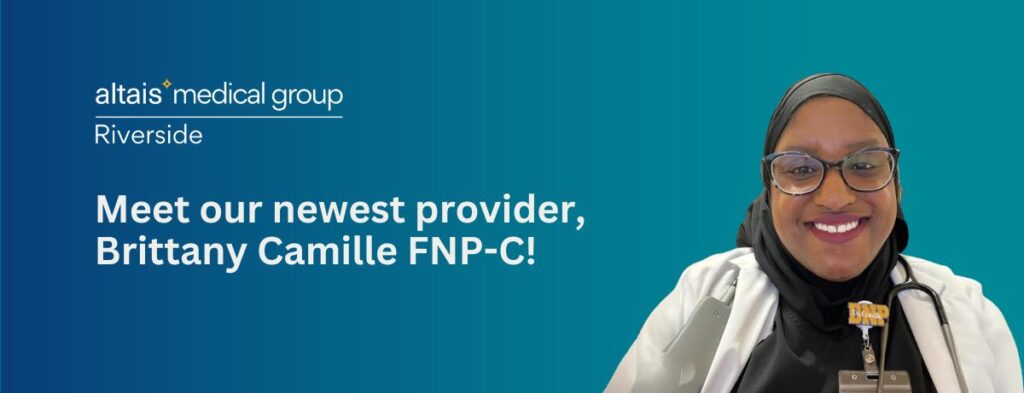
Brittany Camille, FNP-C, brings over a decade of diverse nursing experience to her role as a Family Nurse Practitioner at Altais Medical Group Riverside.
With a Doctor of Nursing Practice from University of Massachusetts Global and specialized expertise in adult and geriatric care, Brittany is passionate about patient education, preventive care, and staying current with medical advancements. Her approach, shaped by her extensive bedside nursing experience, focuses on building strong patient relationships and providing comprehensive, personalized care. In this Q&A, Brittany shares insights into her practice philosophy, the challenges of geriatric care, and her commitment to continuous learning in the ever-evolving field of healthcare.
Q: With over a decade of experience in various nursing settings, how has your diverse background shaped your approach to patient care as a Family Nurse Practitioner?
A: My bedside nursing experience has been invaluable in shaping my approach as a Family Nurse Practitioner. It’s given me a deep understanding of patient care, from medication management to fall prevention. I’ve treated everyone from celebrities to homeless individuals, which has broadened my perspective and made me more adaptable.
This diverse experience has enhanced my confidence in patient communication and given me insights into various cultural norms. It’s also reinforced the importance of patient education – a cornerstone of nursing practice.
I’m often surprised by mid-level providers who lack extensive bedside experience. I’ve seen some struggle with social skills or neglect patient education. My background in nursing education and public health has really underscored the critical role of patient education in care.
Q: You have specialized expertise in adult and geriatric care. What unique challenges do these populations face, and how do you address them in your practice?
A: Geriatric patients, and some younger adults with complex needs, require a thoughtful approach to care. We need to consider how treatments might affect their mental status, mobility, and ability to care for themselves. There are also often financial considerations, especially for those on fixed incomes.
For example, I’m cautious about prescribing certain medications like oxybutynin or benzodiazepines to elderly patients due to potential side effects. It’s crucial to weigh the benefits against the burden of treatment and ensure patients can understand and follow recommendations.
I particularly enjoy working with geriatric patients. Their life experiences and wisdom are fascinating, and the complexity of their cases keeps me learning. I’m deeply committed to improving their quality of life.
Q: Your approach focuses on patient education and preventive care. Can you share an example of how this philosophy has made a significant difference in a patient’s health outcomes?
A: I once had a patient who came in for a post-hospital follow-up after being admitted for high blood sugar. Initially, she was guarded and mistrustful, and our interaction was challenging. She wasn’t taking her diabetes medications correctly and wasn’t making necessary lifestyle changes.
I spent considerable time educating her on proper medication use and lifestyle modifications. When she became upset, I suggested we continue our conversation the next day. I assured her that I genuinely cared about her health and wanted to work together to prevent future hospitalizations.
When she returned, her attitude had completely changed. She was open and receptive. Over time, she became one of my most cooperative patients, even though other providers found her difficult. Through the treatment plan we developed together and her commitment to lifestyle changes, her Hemoglobin A1C dropped from over 13 to less than 6.5 in just a few months.
This experience reinforced the power of patient education and building trust. It’s one of many rewarding relationships I’ve developed with patients, and it’s tough to leave them behind when changing practices.
Q: You’re committed to staying current with the latest medical advancements. Can you tell us about a recent development in healthcare that you’re particularly excited about and how it might benefit our patients?
A: I recently came across new recommendations for vitamin D that really surprised me. Previously, I was taught that many people, especially those with darker skin, were deficient in vitamin D. We believed it helped prevent various conditions, from osteoporosis to heart disease.
However, new guidelines recommend against routine vitamin D testing in healthy adults under 75 without prediabetes. Some studies have shown little to no significant impact on outcomes like fractures, cardiovascular disease, or mortality.
This revelation was a bit shocking, as I’ve routinely ordered vitamin D tests and prescribed supplements for most patients. It’s a powerful reminder that medicine is constantly evolving, and we can never stop learning.
While I can’t say I’m excited about these changes, they underscore the importance of staying informed. I regularly listen to medical podcasts and subscribe to professional organizations to keep up with the latest developments. It’s all part of doing my best for my patients.
MEDICAL DISCLAIMER: The content of this Website or Blog is not intended to be a substitute for professional medical advice, diagnosis, or treatment. Always seek the advice of your physician or other qualified health provider with any questions you may have regarding a medical condition. Never disregard professional medical advice or delay in seeking it because of something you have read on this Website or Blog.
If you think you may have a medical emergency, call 911 immediately, call your doctor, or go to the emergency room/urgent care.

